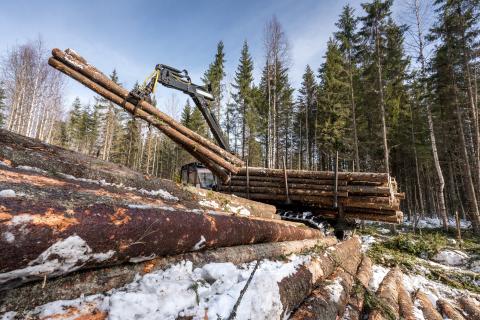Russian Roundwood Act: implications for legality risk assessments
An analysis published by Forest Trends explores the ramifications of the recent Russian Roundwood Act with regard to legal timber trade.
The Roundwood Act is an amendment to the Russian Forest Code, adopted in December 2013. This law contains requirements for documentation as well as the measurement, marking, registration, and transport of roundwood. It may thus constitute an important step towards securing legal timber production and trade in Russia.
 Forest Trends has published an analysis prepared by NEPCon which explores the potential of this new law from a legal timber sourcing perspective. It concludes that “[…] The amended Act contains limitations as well as possibilities for minimising the risk of sourcing timber from unknown or illegal sources as part of a due diligence system”.
Forest Trends has published an analysis prepared by NEPCon which explores the potential of this new law from a legal timber sourcing perspective. It concludes that “[…] The amended Act contains limitations as well as possibilities for minimising the risk of sourcing timber from unknown or illegal sources as part of a due diligence system”.
Whilst the Act contains several positive measures, a number of factors limit the Act’s potential impact, including amongst others the persistence of high corruption levels and the Act’s narrow focus on roundwood, leaving a “sawnwood loophole”.
Guidance for importers to regulated markets
The analysis also looks specifically at the implications for importers of Russian timber to regulated markets such as the EU, the United States and Australia. Despite limitations, importers may take heart in some of the concrete measures outlined in the Act.
 These include marking of high-value timber species such as oak, beech and ash from January 2015. Illegal logging of Russian hardwoods is a significant problem, as demonstrated in the report liquidating the forests, released by EIA in October 2013.
These include marking of high-value timber species such as oak, beech and ash from January 2015. Illegal logging of Russian hardwoods is a significant problem, as demonstrated in the report liquidating the forests, released by EIA in October 2013.
The report covers the extent of illegal logging in the Russian Far East, focussing on the largest hardwood flooring retailer in the US, Lumber Liquidators. Providing it is well enforced, a functional marking system may help importers to secure legal supplies of valuable hardwoods from Russia.
The measures laid out in the Roundwood Act will be phased in gradually. The analysis provides the key milestones and recommends importers to keep an eye on the process. The effect of those measures will to a large degree depend on the efficiency of the Russian authorities’ enforcement.
Importers are also recommended to follow a cautious approach with due consideration to the remaining issues of concern and the risks involved.
DOWNLOAD
> Analysis of the Russian Roundwood Act
> PowerPoint presentation



